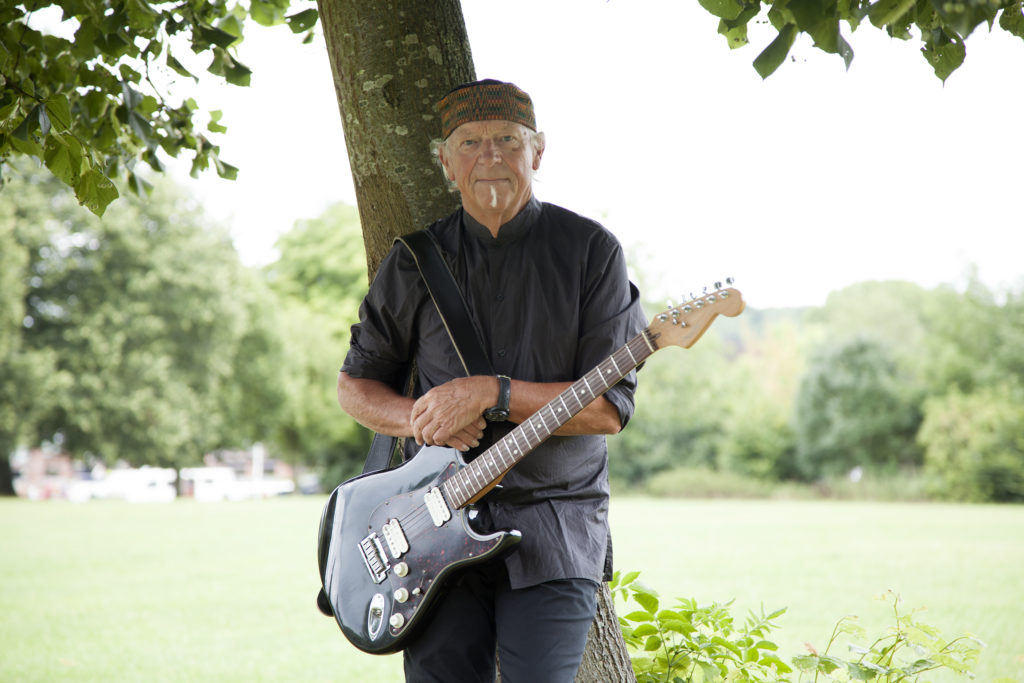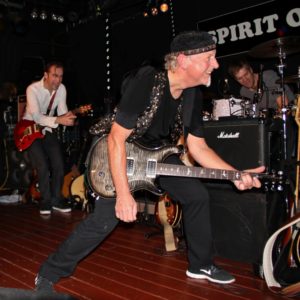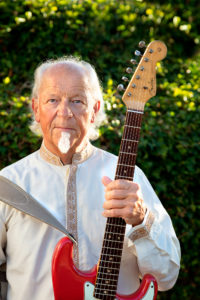
A professional touring and recording musician since he was 20 years of age, Martin Barre has spent the entirety of his adult life plying highways and byways around the globe, sharing his talent and passion for progressive, folk-infused rock music to millions of fans.
For the bulk of that time, 43 years, he was an integral part of legendary progressive rock act, Jethro Tull, being almost as readily identified with that band’s mercurial, genre bending style and sound as its iconic frontman and flautist, Ian Anderson. But Barre has also carved out a solid career as a solo artist, beginning during some Tull downtime in the 1990s, releasing his first solo album A Trick of Memory in 1994, followed by The Meeting in 1993, and Stage Left in 2003.
But it was really once Anderson took Jethro Tull off the road, essentially ending the band’s tenure as a collective touring and recording entity in 2012, that Barre began channelling his amble artistic talents back into his own career, putting out four critically acclaimed albums since then – including his most recent, Roads Less Travelled, which came out earlier this month internationally on Cleopatra Records, and which sees him in the midst of a very busy touring schedule, including a number of dates in North America.
Barre obviously loves to play and share his music with fans, but he is also savvy enough to understand that he is still essentially new at the solo music game and needs to get his face and music in front of as many fans as possible to continue to grow that fan base beyond simply curious Tull fans.
“It’s probably the most intense schedule we’ve had, and even when we’ve had a couple of days off on the road, we’ve done a couple of recording sessions, so we’re always keeping ourselves busy playing. But everybody’s in a good mood, the audiences have been great, and the band is sounding as good as it ever has. I like being busy and it seems to be getting busier, certainly since Tull finished I have been crazy busy. There are dates in America once or twice a year, and I think this is our sixth U.S. tour. We always try to pop up to Canada for a bit too while we are there. And then after this I have a European tour,” said Barre, during a tour stop just outside Washington, D.C. earlier in the month.
“It’s nice to be in demand. In some ways, mostly because of the travel, I could do with being a little less busy, but I can’t turn down the opportunity to play concerts. It’s a new era and it’s kind of the beginning of our career as the Martin Barre Band. So, I just want to do as much as I possibly can. It’s sort of like rebranding, to talk in business terms. Essentially, I’ve got to get my brand – my name – out there. There’s a lot of fans, particularly Jethro Tull fans, and they’re sort of up for grabs. Ian is doing less and less every year, and of course I want to do more and more. So, there’s going to be a gradual settling of the fan base between what Ian does and what I do, or more accurately, a crossover between the two.
“I know that I have a long way to go, and typically this is the hardest end of it, because we’re playing smaller theatres and bigger clubs and we’re trying to move up into the medium-sized theatres and venues which will make life easier. It will make the finances work better and we won’t have to work this crazy schedule that we have now.”
Roads Less Travelled is emblematic of Barre’s ability to craft memorable songs that incorporate the various styles that have imbued his sound over the years, particularly the folk-rock and prog-rock elements that are hallmarks of Jethro Tull’s most memorable musical moments. But he is not trying to seduce Tull fans by giving them more of the same, as Roads Less Travelled is somewhat more stripped down and more emotionally evocative in its compositional subtlety that many of Tull’s records were.
“I sort of have the ammunition in my guitar playing and mandolin playing to enable me to write quality music or very ‘full on’ music, not to say whether it’s going to be good or bad, but I’ve got all the ingredients readily available. Putting them together and writing a good song is the challenge, and that’s what I find really exciting with what I am doing at the moment. On this new record, it’s like a melting pot of every type of music that I’ve listened to over the last 50 years, and I am sort of extracting bits and pieces of it into my songwriting, which I guess is why the title of the album makes sense,” Barre explained.
“I have never had an agenda or a specific plan for an album. I don’t want to write a blues album, I don’t want to write a riffy rock album, or a folk album. I want all those elements in what I write, and maybe it becomes disjointed, but I just like variety. I like that music allows you do that. You can have a song that is like a Delta blues number and the next one can have a big Led Zeppelin riff with full on vocals over it. I just think an album should take the listener on a journey and be interesting to listen to from front to back. When I listen to CDs that are all kind of the same thing, I really do lose interest, even if the playing is great. Unless there’s a good amount of light and shade and dynamics in the writing as well as the playing, I find it boring.”

Barre admits that he is still a work in progress when it comes to writing lyrics, but that he put his best effort into the tracks on Roads Less Travelled, working in close collaboration with the primary singer in his solo band Dan Crisp. The band is rounded out by bassist Alan Thompson, drummer Darby Todd and back-up vocalists Becca Langsford and Alex Hart.
“I guess all lyricists draw on their own experiences and therefore they are from life. But I have taken liberties and I put myself in the shoes of someone I am not, but someone that I know, or have experienced or have met or am aware of, or even somebody I saw in a movie. But for each song I rewrote the lyrics so many times, because they don’t come easily to me. For some of the songs, I might have had 10 sets of lyrics before I found something that was acceptable. And lyrics are the last thing to come because I put them off. My wife said I should be on the road with a notebook and when a line or idea comes into my mind, just write it down so that when it comes time to do the next album, I have all these ideas – but I never do it,” he said with a chuckle, adding that the music always comes first in his compositional process.
“I always start with the germ of an idea, it might be a riff or a mandolin part. That has to be the jumping off point, and then I build on it, build on it, build on it, arrange it, do all the bits – so the music goes under a ridiculous amount of scrutiny. But then I have a huge block of 10 or 11 songs that I’ve got to write lyrics for, which is a crazy amount of work for me.”
For live audiences, even though this is the 50th anniversary year for Jethro Tull, Barre said he isn’t going out of his way to overload the set list with Tull songs. It is about balance. He understands that his long affiliation with the band is often going to be the gateway to his own music and shows, but he also wants audiences to walk away not only happy to hear old favourites, but also excited to hear his own music, and what is yet to come from his fertile mind.
“Right now, we are doing three songs from Roads Less Travelled, we do three songs from the previous album Back to Steel, and then we do a couple of tracks that are neither mine nor Tull’s like maybe a Beatles song. So, it’s about 60 per cent Tull and 40 per cent my material. But, you know, it varies – there is no formula that I feel the need to stick to. Right now, it’s a proportion that seems to keep everybody happy, including me and the band,” he said.
“I am not bothered about how much of the music is mine and how much of it is Tull’s, because it’s obviously really, really good. We do songs because they’re good and sound great when we play them, and that’s the only reason you need. And I know it’s strange to be talking about Tull’s music like its separate, but I think I am sort of one step away from it in the sense that my band isn’t Jethro Tull. Ian’s band isn’t Jethro Tull, so there technically isn’t a Jethro Tull in existence. There is the historic music of that band, and I don’t want to be pigeonholed as a band that just plays Tull.
“Maybe I want the best of both worlds, because I really do want my music to sit side by side with Tull. It’s as important and, in some respects, more important because in an ongoing sense it will be my music that I continue to write and record and perform. Tull is sort of the foundation, the building blocks, but the structure of my music and my show is built on that foundation and extends it. I always make it pretty clear that it’s an evening of music from Jethro Tull and my own solo albums and certain things that are just thrown in there for the hell of it. As long as the end result is a really good balance show, then everybody is happy.”
Barre was an integral member of Jethro Tull from the time he joined in 1969 to when the band essentially folded up shop in 2012. He recorded and co-wrote material on every Tull album from their second release Stand Up, including their massive 1971 hit record Aqualung, through Heavy Horses, Songs from the Wood, Under Wraps and more. 2018 marked the 50th anniversary of the band’s first album, and co-founder Ian Anderson took a band out on the road for much of the year, under the Jethro Tull banner, playing a selection of the band’s repertoire, primarily from the 1970s.
Barre is also commemorating the 50th anniversary of the band for which he can rightly claim credit for helping mould its sound by including a number of tracks from the band’s legacy in his solo shows as his own personal celebration. Having a legacy that is now five decades old, and with the music still popular, Barre is pleased that he can commemorate the occasion for fans.
“I think it’s important because in the past we had anniversaries come and go and they were ignored, which quite annoyed me. I always thought we should have a big party and get all the members and everybody that has worked for Jethro Tull in the room and have a get together. I think a celebration of anniversaries is a really important thing. I think something like the 25th or 40th or 50th is a landmark that needs to be recognized – not overblown – but just recognized. And maybe use it as an excuse to do something special for the fans,” he said, adding that he is enjoying his own version of a celebration as he continues to tour through North America.
“I am not doing this without having a lot of passion about it. I think the fact that we have been in North America for 50 years is pretty amazing. It’s an amazing history. I think music history is important – an important part of culture. I think the history of rock and roll and blues and pop music and prog music and metal gets more important as it gets more documented and recognized as time goes along. I know Ian was a little reluctant to do a 50th anniversary tour. I think the problem with Ian is that he can’t celebrate it because he doesn’t really have anything to do with ex-members of Tull. I think he is a very solitary person; he is just focussed on his own career and the band that he works with. He is more of a solo artist now. I don’t think he wants to share that. I don’t think he would want to be in a circumstance where Jethro Tull goes on the road and it’s a shared billing with other band members.
 “For me, I see the entire picture of all the people who have worked for Tull – they all have an important place. I think Ian probably dilutes that. He sees what he has done and doesn’t really acknowledge what everybody who was in Jethro Tull did for the music and for the band, to different degrees. Everybody who contributed is part of the history. And that history is really the music we all created together. I think the reason people still love it is that the know we put a lot into it. There is just so much music in each song and on each album. When I am sort of revisiting old Tull albums to look at tracks to do live, I am amazed there is so much material that is interesting and musical and melodic. It’s a big pool of music, and there’s lots for people to really get into.”
“For me, I see the entire picture of all the people who have worked for Tull – they all have an important place. I think Ian probably dilutes that. He sees what he has done and doesn’t really acknowledge what everybody who was in Jethro Tull did for the music and for the band, to different degrees. Everybody who contributed is part of the history. And that history is really the music we all created together. I think the reason people still love it is that the know we put a lot into it. There is just so much music in each song and on each album. When I am sort of revisiting old Tull albums to look at tracks to do live, I am amazed there is so much material that is interesting and musical and melodic. It’s a big pool of music, and there’s lots for people to really get into.”
Barre said the approach he takes to his solo music is the same that he did when a member of Tull – he puts everything into each note, each lick, each strum of the guitar or mandolin that he can.
“I do what I do, the way I have always done it. I don’t ever want to shortchange people, so it has to be everything to me. And it’s the same for my band. They all have a lot to do with the recordings. I write all the music and pretty much do all the arranging, but I don’t tell them what to play, because I want them to be inventive and I want to be invested in the music and to be a big part of the end result. Everybody has carte blanche, especially the singers: I want them to put their personality into each track, because that’s why they are singing it. I make sure they understand they are not just paid help, they are part of the band, and their performance and their interpretation of the song is important,” said Barre.
For more information on Roads Less Travelled, and Barre’s ongoing solo tour visit http://martinbarre.com.
- Jim Barber is a veteran award-winning journalist and author based in Napanee, ON, who has been writing about music and musicians for a quarter of a century. Besides his journalistic endeavours, he now works as a communications and marketing specialist. Contact him at jimbarberwritingservices@gmail.com.
SHARE THIS POST:
